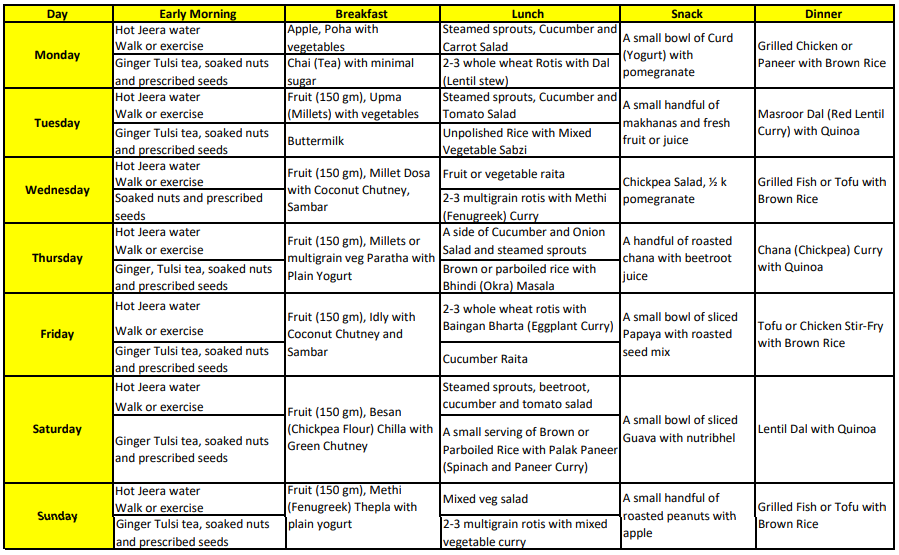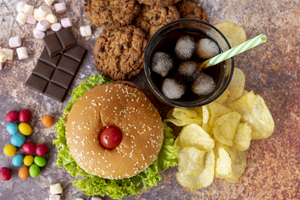Learn why leading HR professionals trust ekincare! Explore Now

Welcome to another blog on a comprehensive guide to managing Polycystic Ovarian Disease (PCOD). In our previous blog, we ventured into the complex realm of PCOD, shedding light on its symptoms, causes, and implications for Indian women, particularly those juggling busy careers. Emphasizing the significance of early identification and management, we now focus on this blog, where we dive into practical solutions. Here, we'll explore essential topics such as seed cycling and unveil a meticulously tailored diet plan designed to empower Indian women to navigate the challenges of PCOD. We'll also provide insights into what foods to include and which to avoid, ensuring a holistic approach to your well-being.
Now, let's delve into a critical facet of PCOD management: The Diet Plan.

Maintaining a balanced diet is instrumental in managing PCOD, and having a well-structured diet for PCOD patients is essential. Here's a 7-day meal guide meticulously designed for busy Indian working women grappling with PCOD. This diet plan, tailored specifically as a “diet plan for PCOD”, is crafted to regulate hormones, manage weight, and promote overall well-being. Importantly, all items in this meal plan are Indian, easily accessible, and customizable to suit your taste preferences and dietary restrictions.
Some suggestions before we jump into The Diet Plan:
Always start your breakfast with fruit and lunch with salad at a gap of 10 to 15 minutes, preferably.
Try to maintain the body's circadian rhythm by sleeping at 11:00 p.m. and waking up at 6:00 a.m.
Here’s the generalized meal plan for women suffering from PCOD. But it is advisable to consult your dietitian before you make too many changes to your diet.
 These Indian food options offer a wide variety of traditional flavours and dishes while helping manage PCOD. Adjust portion sizes according to individual needs and consult with a healthcare professional or dietitian for personalized guidance on managing PCOD through diet.
These Indian food options offer a wide variety of traditional flavours and dishes while helping manage PCOD. Adjust portion sizes according to individual needs and consult with a healthcare professional or dietitian for personalized guidance on managing PCOD through diet.

Seed cycling is a nutritional strategy believed to aid hormone regulation, particularly in conditions like PCOD, though scientific evidence is limited. It involves a 28-day cycle with two phases:
Follicular Phase (Days 1-14): Estrogen levels rise during the first half of the menstrual cycle. Consume 1 to 2 tablespoons of freshly ground flaxseeds and pumpkin seeds daily. They are rich in lignans, zinc, and magnesium, potentially assisting estrogen modulation and hormone balance.
Luteal Phase (Days 15-28): The second half sees progesterone levels increasing. Incorporate a daily intake of 1 to 2 tablespoons of freshly ground sesame seeds and sunflower seeds into your diet. Sesame seeds offer lignans and healthy fats, while sunflower seeds provide vitamin E and hormone-supportive nutrients.
Using freshly ground seeds is crucial for better absorption. When implementing seed cycling for PCOD, it typically takes about 3 months of consistent adherence to the regimen to begin noticing significant results in symptom management. However, seed cycling should complement, not replace, medical treatment for PCOD. It is best to seek guidance from a healthcare professional to get a precise diagnosis and appropriate treatment.
Always opt for hormone-free organic products, especially dairy, fish, and poultry, to avoid the risk of xenoestrogens.
Stay away from plastics and packaged foods and opt for chemical and pesticide-free foods.
1) Turmeric: Known for its anti-inflammatory properties, turmeric can help manage PCOD-related inflammation.
2) Cinnamon: May aid in regulating menstrual cycles and insulin levels.
3) Fenugreek (Methi): Contains compounds that may help control blood sugar levels.
4) Ginger: Known for its anti-inflammatory properties and potential to reduce menstrual pain.
5) Garlic: May help regulate insulin and improve lipid profiles.
6) Green Leafy Vegetables: Rich in essential nutrients and fiber, they support overall health.
7) Berries: Low in sugar and high in antioxidants, they are a PCOD-friendly fruit option.

8) Legumes: Lentils, chickpeas, and beans stand out as fantastic sources of plant-based protein and fiber.
9) Nuts: Almonds, walnuts, and cashews provide healthy fats and nutrients.
10) Greek Yogurt: A protein-rich option that can aid in weight management.
11) Lean Proteins: Include fish, chicken, and tofu for balanced nutrition.
12) Quinoa: A gluten-free grain packed with protein and fiber.
13) Curd (Yogurt): A probiotic-rich food that supports gut health.
14) Avocado: Contains healthy fats and is a nutritious addition to salads.
15) Olive Oil: Use it for cooking to incorporate healthy monounsaturated fats.
16) Coconut: In moderation, it can add flavour and healthy fats to your meals.
17) Chia Seeds: Chia seeds are renowned for their richness in fiber and omega-3 fatty acids.

18) Eggs: Eggs are a valuable reservoir of protein and essential nutrients.
19) Tomatoes: Rich in antioxidants and vitamins.
20) Green Tea: May help regulate insulin and improve metabolism.
1) Processed Foods: Be cautious of processed foods, as they often contain excessive amounts of sugar, salt, and unhealthy fats. 
2) Sugary Drinks: Sodas and sweetened beverages can spike insulin levels.
3) White Bread and Refined Grains: Choose whole grains instead.
4) Deep-fried foods: Increase inflammation and weight gain.
5) Red Meat: Opt for lean proteins like chicken or fish. 
6) Full-Fat Dairy: Choose low-fat or skim options.
7) Sweets and Desserts: High sugar content can worsen insulin resistance.
8) Excessive Salt: Can lead to water retention.
9) Highly Caffeinated Beverages: Limit your caffeine intake.
10) Alcohol: Can disrupt hormonal balance.
11) Artificial Sweeteners: Some may affect insulin levels.
12) Highly Spiced Foods: Can cause digestive discomfort.
13) White Rice: Prefer brown or parboiled rice. 
14) Fried Snacks: High in unhealthy fats and calories.
15) Trans Fats: Trans fats can be detected in numerous processed and fast-food items.
16) Soy Products: Excessive soy consumption may impact hormone levels.
17) High-Sugar Fruit Juices: Choose whole fruits instead.
18) Sauces and Dressings: Many contain hidden sugars.
19) Fast Food: frequently contains excessive calories and unhealthy fats.
20) High-Sugar Cereals: Choose low-sugar options. 
Concluding our guide, we hope we've provided you with valuable insights into managing PCOD through a specialized diet plan, including the concept of seed cycling. By focusing on the foods to include and those to avoid, we aim to empower you with the tools and knowledge you need to successfully navigate the complexities of PCOD. Always remember, your health is your most precious asset, and ekincare is here to support you with expert guidance in women's health and wellness. We're committed to helping you embrace a healthier, more balanced life.
Learn how your organisation can get the best employee health and well-being experience with ekincare`s commitment to quality.